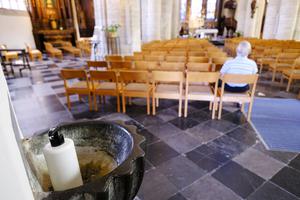Catholic Archdiocese Delivers Food to Families Hit by India’s 2nd COVID-19 Wave
Archdiocese of Bhopal has made a pastoral center available for use as a quarantine facility, providing free food and doctors’ services.

A Catholic archdiocese in India is continuing to distribute food to families affected by the country’s devastating second wave of COVID-19.
The Archdiocese of Bhopal in central India said July 2 that, in addition to providing food packages, it was helping the poor to pay medical bills.
In a letter to clergy dated May 24, Bhopal Archbishop Leo Cornelio wrote: “The second wave of COVID-19 pandemic, as we well know, has brought much suffering and pain to the whole of humanity all over the world; but more specially to the people of our country. We have all experienced this pain in different degrees.”
“I extend my heartfelt condolences to all – our priests, religious and lay faithful, as well as our collaborators and friends, who have lost their loved ones.”
“A considerable number of priests, religious and faithful in our archdiocese too were affected by the virus. We thank God that most of them have recovered and are healthy again.”
In the July 2 press note, the Latin Rite archdiocese, located in Bhopal, the capital of Madhya Pradesh state, said that it had made a pastoral center available for use as a quarantine facility, providing free food and doctors’ services.
Archbishop Cornelio, a member of the Divine Word Missionaries, told reporters that April and May were critical months for the archdiocese as the coronavirus death toll mounted.
He said that the archdiocese, which he has led since 2007, lost 49 Catholics, one priest and four religious sisters in the two-month period.
He highlighted the pain of those who were unable to pay homage to their deceased loved ones.
He added that he prayed that the people of the archdiocese would be spared similar suffering due to the pandemic in the near future.
India, which has a population of 1.3 billion people, has recorded more than 30 million cases of COVID-19 and more than 400,000 deaths as of July 6, according to the Johns Hopkins Coronavirus Resource Center.
Local media report that the country is preparing for a third wave of the coronavirus that could peak in the fall.
Pope Francis said in May that he was praying for the people of India as they faced a second wave of the virus that threatened to overwhelm the country’s health system.
In a message to Cardinal Oswald Gracias of Bombay, president of the Catholic Bishops’ Conference of India, the Pope expressed his “heartfelt solidarity.”
He wrote: “At this time when so many in India are suffering as a result of the present health emergency, I am writing to convey my heartfelt solidarity and spiritual closeness to all the Indian people, together with the assurance of my prayers that God will grant healing and consolation to everyone affected by this grave pandemic.”
He continued: “My thoughts go above all to the sick and their families, to those who care for them, and in particular to those who are mourning the loss of their loved ones.”
“I think too of the many doctors, nurses, hospital workers, ambulance drivers, and those working tirelessly to respond to the immediate needs of their brothers and sisters. With deep appreciation, I invoke upon all of them God’s gifts of perseverance, strength, and peace.”
- Keywords:
- covid-19
- india
- coronavirus
















